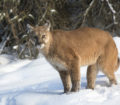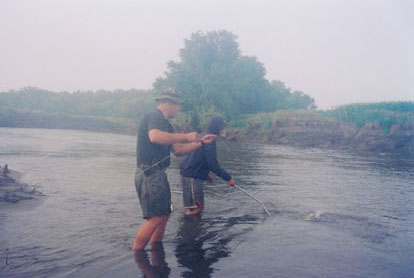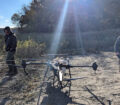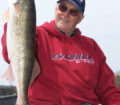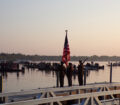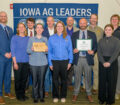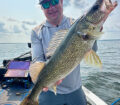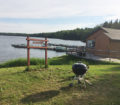By Steve Weisman
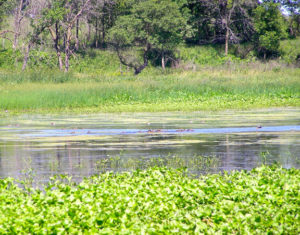
(photo by Steve Weisman)
A shallow wetland like this one helps slow runoff into main lakes.
Would you believe it we are about three months from the third annual Okoboji Blue Water Festival? Seems like a lot, but I guarantee you it will be here before we know it. Just wanted to give a tip of the hat to chief organizer Greg Drees and his band of hardworking volunteers. The first two festivals were awesome, but I have a feeling this third one could top them both.
You know, water quality is so important to us, but how often do we really take the time to reflect on that importance. Without clean water, we are in a world of hurt. Just ask Flint, MI and the troubles they have had. It all began when they changed their drinking water source from Lake Huron to the Flint River. What a mess it has been over the past four years: studies. Warnings, illnesses, deaths, lawsuits, and false information have led to complete turmoil and local, state and federal investigations. All the while, the city residents have actually been hostage by a lack of clean water and the need to use bottled water for human consumption. The bottom line: a lack of clean water and some not very wise decisions.
However, the clean water issues are not just in Flint. Concerns about clean water reverberate across the entire country. For our drinking water to be safe enough to drink, municipalities must do a lot of “doctoring” to make the drinking water safe for human consumption. I can remember growing up on the farm, and in the spring or when we had extreme runoff after heavy rains, we had to check our well for safety. It was a shallow well, and runoff would cause it to become contaminated so that we had to get our water from town until it settled down. That still holds true today.
So, runoff is a huge part of the equation for clean water. Although the water running into our lakes looks sparkling clean and fresh, we know we don’t dare drink from those tiles and streams. Yes, whether we are in a rural or urban community, on an acreage or on a farm, what runs off into our lakes and streams comes from us and is certainly not safe.
Expanding this runoff issue to a more regional and national scope, let’s look at the “dead zone” in the Gulf of Mexico. Would you believe parts or all of 31 states, including Iowa, are part of this Mississippi River drainage system. The Mississippi River and its tributaries drain 41 percent of the United States and carry nutrients like nitrogen and phosphorus right down to the Gulf of Mexico. Yes, we are part of what is called the “dead zone” in the Gulf of Mexico. Sadly enough, the Gulf’s dead zone is now the largest on record. Around 8,776 square miles of ocean is almost lifeless. These kinds of statistics underscore the need to really work at improving water quality.
That is why the efforts of Drees and his volunteers are so important. The Okoboji Blue Water Festival is a day of celebrating clean water efforts, educating both adults and youngsters about the issues and then offering potential answers through dialogue with clean water businesses and organizations, along with two different panels addressing clean water issues and potential answers.
Be part of the solution
Certainly, we love our Iowa Great Lakes, and we have thousands of users enjoy these waters. HOWEVER, how many of us give back to these lakes? How many of us really things to help protect these waters?
Here is a suggestion. I encourage all of us that live here in the Iowa Great Lakes and those that visit or reside here in the summer to become part of the solution. Join one of the many protective and environmental organizations that work so diligently to keep these waters clean.
As a member of the Okoboji Protective Association (OPA), I extend the opportunity to become part of the OPA. It’s a group of dues paying members dedicated to preserving the lakes for future generations.
OPA goals include the following:
- preventing invasive species
- preserving and protecting the wetlands in the Iowa Great Lakes watersheds
- participating in the control of lake developments to prevent environmental threats
- promoting sustainable urban and agricultural development that won’t upset the delicate ecological balance of the lakes and watershed
- informing the community of any concerns and actions that must be taken to act on those ecological concerns
For membership information and for more detailed information on the OPA, go to www.okobojiprotectiveassociation.org and also take time to visit the OPA’s Facebook page. The Facebook page shares the love of the “Lakes” through a wide range of photos taken throughout the year.
As we hit the 2018 open water season, I hope we can all work together to protect and enhance our area lakes. Come out to the August 11 Okoboji Blue Water Festival and be part of the answer!

